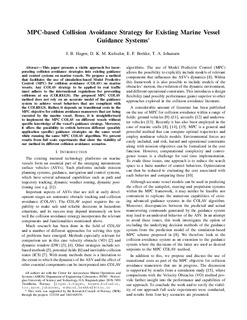MPC-based Collision Avoidance Strategy for Existing Marine Vessel Guidance Systems
Journal article, Peer reviewed
Accepted version

View/
Date
2018Metadata
Show full item recordCollections
Original version
IEEE International Conference on Robotics and Automation. 2018, 7618-7623. 10.1109/ICRA.2018.8463182Abstract
This paper presents a viable approach for incorporating collision avoidance strategies into existing guidance and control systems on marine vessels. We propose a method that facilitates the use of simulation-based Model Predictive Control (MPC) for collision avoidance (COLAV) on marine vessels. Any COLAV strategy to be applied in real traffic must adhere to the international regulations for preventing collisions at sea (COLREGS). The proposed MPC COLAV method does not rely on an accurate model of the guidance system to achieve vessel behaviors that are compliant with the COLREGS. Rather, it depends on transitional costs in the MPC objective for collision avoidance maneuvers that are being executed by the marine vessel. Hence, it is straightforward to implement the MPC COLAV on different vessels without specific knowledge of the vessel's guidance strategy. Moreover, it offers the possibility to switch between different (possibly application specific) guidance strategies on the same vessel while running the same MPC COLAV algorithm. We present results from full scale experiments that show the viability of our method in different collision avoidance scenarios.